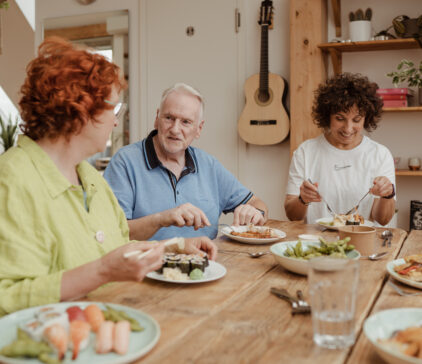
Weight loss myths: Separating fact from fiction
There is so much confusing information out there in the world of health and wellness.
It’s natural to look out for tricks and tips to lose and maintain weight, especially if you’ve been trying to achieve your weight loss goals for some time. However, there is so much noise available online about losing weight that it can be hard to sort fact from fiction.
Here’s the truth about 5 common weight loss myths.

Myth 1: Carbohydrates make you gain weight
One popular myth about losing weight is that carbohydrates should be avoided as they make you gain weight. However, this is a misconception.
Carbohydrates are a crucial source of energy for our bodies, and cutting them out entirely can have adverse effects on our overall health.
Instead of eliminating carbs, it’s important to make informed choices about the types and amounts of carbs we consume. Opting for whole grain carbs, like wholemeal brand and brown rice, can give us a bigger bang for our buck as they often contain protein, fibre and important vitamins and minerals. This can keep us feeling fuller for longer and supports a healthy lifestyle.
On the other hand, sugary snacks and drinks should be limited as they are often high in calories and offer little nutritional value. Remember, a balanced approach to carbohydrates is key to a sustainable, effective and healthy weight loss journey.
Myth 2: Low-fat is a healthier choice
Much like carbohydrates, a no- or low-fat diet is often claimed to be a top trick when trying to lose weight.
While opting for reduced-fat or low-fat foods may seem like a smart choice, it’s important to understand that fat itself is not inherently unhealthy. In fact, fat plays a crucial role in our diet, helping us feel full and giving us energy.
Rather than avoiding fat altogether, it’s important to pay attention to the quantity and quality of fats we eat when trying to lose weight. Checking food labels of low-fat products is also crucial, as some of these products may compensate for the reduced fat content by adding sugar.
Myth 3: Skipping meals saves calories
It’s very common for people to miss meals like breakfast in order to eat a bigger meal later in the day. You’re “good” all day, however ultimately end up overeating when you do eat.
This cycle of restriction and overeating happens over and over again, and can lead to feelings of guilt or shame, followed by further attempts to restrict food.
Skipping meals altogether can make you hungrier, more tired and may mean you miss out on essential nutrients.
For most people, eating regularly throughout the day can help to manage hunger and reduce unplanned overeating or bingeing. Try eating within the first hour or so of waking and then regular meals and snacks throughout the day.

Myth 4: You must do intense exercise to lose weight
Exercise can indeed support weight loss, however an intense regime isn’t the only way to reach your weight loss goals.
Being physically active can include many different things, but all types of movement fall into 2 basic categories: everyday activity and exercise.
NHS England recommends that adults should get at least 150 minutes of physical activity a week, like walking and cycling. However, it’s important to also consider the movement you do in your daily life, like housework, gardening, or taking the dog for a walk.
Regular physical activity is not only good for your physical health, but your mental well-being too. It can improve your mood, make you feel more energised and help you sleep better.
The key to physical activity is consistency and finding something you enjoy. Exercising so intensely you are exhausted for the rest of the week and don’t do any other activities is counterproductive and risks injury. Finding a balance between moderate and high intensity activities you can do regularly will help exercise become part of your life.

Myth 5: Fat burning foods will help you
The myth of “fat burning” foods can be misleading. While certain foods like pineapple, ginger, celery, broccoli, or green tea may be touted as “fat burning” superfoods, there is limited scientific evidence to support these claims.
It’s important to remember that no single food can magically “burn fat” or lead to significant weight loss on its own. Rather, sustainable weight loss requires a balanced diet, regular physical activity, and healthy lifestyle habits.
Be wary of slimming tablets or supplements that claim to help with weight loss, as their effectiveness and safety can vary. If you’re considering weight loss medications, it’s best to consult with your GP for prescribed options that are proven to be safe and effective.
How can you tell the fact from the fiction?
Here are some questions to ask yourself next time you read or hear a claim about diet or health:
How much evidence backs up the claim?
Double check that the advice is based on solid scientific research. Watch out for recommendations based on only one study or research which is still taking place.
Who’s giving the advice?
Usually, if someone tells you to either “always” or “never” do something, it’s likely they’re promoting a weight loss myth.
To ensure reliable information, look for credible sources such as websites with domain extensions like .gov (government institutions), .nhs.uk (the National Health Service), .edu (educational institutions), or .org (non-profit organisations).
Does it sound too good to be true?
If it does, it probably is. Any “weight loss miracle” is unlikely to be miraculous. The relationship between food, your body, and your weight is very complex, and anything that promises unrealistic results probably shouldn’t be trusted.

Conclusion
It’s important to approach any weight loss advice with a critical eye and be cautious of myths that sound too good to be true.
The relationship between food, our bodies, and weight is complex, and there are no miracle solutions. It’s best to rely on evidence-based strategies like maintaining a healthy and balanced diet, doing regular physical activity, and making sustainable lifestyle changes.
Remember that weight loss takes time, and it’s important to be patient with yourself.
By staying informed and seeking reliable information from trusted sources, you can make informed choices and embark on a successful weight loss journey.
Are you looking to transform your health?
Discover our programmes to see how we can help you.



